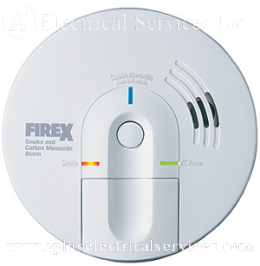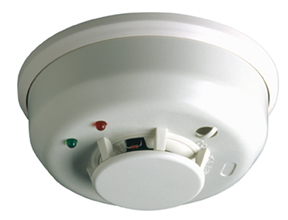Smoke Alarm & Carbon Monoxide (CO) Detectors
- Install smoke alarms on every level of your home, including your basement.
- Contact a licensed electrician to install hard-wired smoke alarms that are wired into your household electrical system and that can be interconnected so that every alarm sounds regardless of the fire's location.
- Install Carbon Monoxide (C0) detectors near any major gas appliances.
In the event of a fire or carbon monoxide emergency, properly installed and maintained smoke alarms and carbon monoxide detectors can save your life by providing an early warning alarm.
![]() Contact A+ Electrical Services to properly install your smoke alarm and carbon monoxide detector for maximum safety.
Contact A+ Electrical Services to properly install your smoke alarm and carbon monoxide detector for maximum safety.
Hardwired Smoke Detectors
Installing a smoke detector may be one of the smartest safety decision you will ever make. Fires can occur in a variety of ways and in any room of your home, so having an interconnected smoke alarm system installed by a professional electrician is the first key step towards your family's safety. Not all homes have interconnected smoke alarms, by interconnecting your smoke alarms it assures you that if one smoke alarm in the house goes off, every smoke alarm in the house will go off. Even if the fire starts and is detected in the basement, people upstairs will still be alerted to the danger.
 |
There are many different brands of smoke alarms available on the market but they fall under two basic types: ionization and photoelectric.
|
Because both ionization and photoelectric smoke alarms are better at detecting distinctly different yet potentially fatal fires, and because homeowners cannot predict what type of fire might start in a home, the USFA recommends the installation of both ionization and photoelectric or dual sensor smoke alarms. We recommend installing a dual sensor 120VAC Hardwired Smoke Alarms with Battery Backups throughout your home.
Where to Install Smoke Alarms |
 Contact A+ Electrical Services to have smoke alarms properly installed throughout your house to protect your family and your property.
Contact A+ Electrical Services to have smoke alarms properly installed throughout your house to protect your family and your property.
Hardwired Carbon Monoxide (CO) Detectors
 |
We believe that carbon monoxide detectors are as important to home safety as a smoke detector. Carbon monoxide gas is produced when we operate common home appliances that use natural gas or wood (furnaces, clothes dryers, water heaters, ovens, ranges, and fireplaces). Hazardous situations are created if these appliances fail to vent properly. Carbon Monoxide Detectors are designed to sound an alarm when the concentration of carbon monoxide vs. oxygen in the designated area, is becoming toxic. |
![]() Contact A+ Electrical Services to have carbon monoxide alarms properly installed throughout your house to protect you and your family from the hazardous effects of natural gas.
Contact A+ Electrical Services to have carbon monoxide alarms properly installed throughout your house to protect you and your family from the hazardous effects of natural gas.
Hardwired Heat Detector
In some areas of the house, it is also important to use a heat detector that senses fire by air temperature, rather than a smoke alarm that senses particles in the air. The installation of heat detector in attics (finished or unfinished), furnace rooms or boiler rooms is recommended, since these locations occasionally experience conditions of high temperature rather than smoke. Heat alarms are designed to alarm when presented with a certain temperature at the alarm. They will not react to smoke and should not be used to replace smoke alarms, but as a supplement to a complete smoke alarm system. |
|
Maintain Smoke and CO Detectors
When was the last time you heard your smoke alarm?
If your smoke alarm or carbon monoxide alarm begins to chirp, signaling low battery power, replace the batteries immediately to prevent you and your family from being unprotected. Remember, these life-saving devices are only effective when they're working properly. Smoke alarms or carbon monoxide alarms with batteries that are weak, disconnected, or missing can't alert you to the dangers of smoke, fire, or carbon monoxide. Disabling a smoke alarm or removing the battery can be a hazardous mistake.
Alarms that are hardwired should have fresh battery backups in case of a power outage, and should be installed by a qualified electrician. For both smoke alarms and carbon monoxide alarms, the batteries need to be replaced at least once per year and the whole unit should be replaced every 8-10 years.
In addition, make sure these alarms are never painted or decorated with paper or stickers. Attaching or covering these devices could keep them from working in the event of an emergency.
![]() To have a local professional electrician install your smoke alarms and carbon monoxide detectors in Chicagoland then please call (773) 297-7177.
To have a local professional electrician install your smoke alarms and carbon monoxide detectors in Chicagoland then please call (773) 297-7177.
| Smoke Alarms & Carbon Monoxide Detectors are an inexpensive way to protect you and your family! |
"Humans are "Creatures of Habit". If you practice safety and good professionalism, it will become habit. If you're careless and cut corners, this will also become habit." - Dave Cameron |


